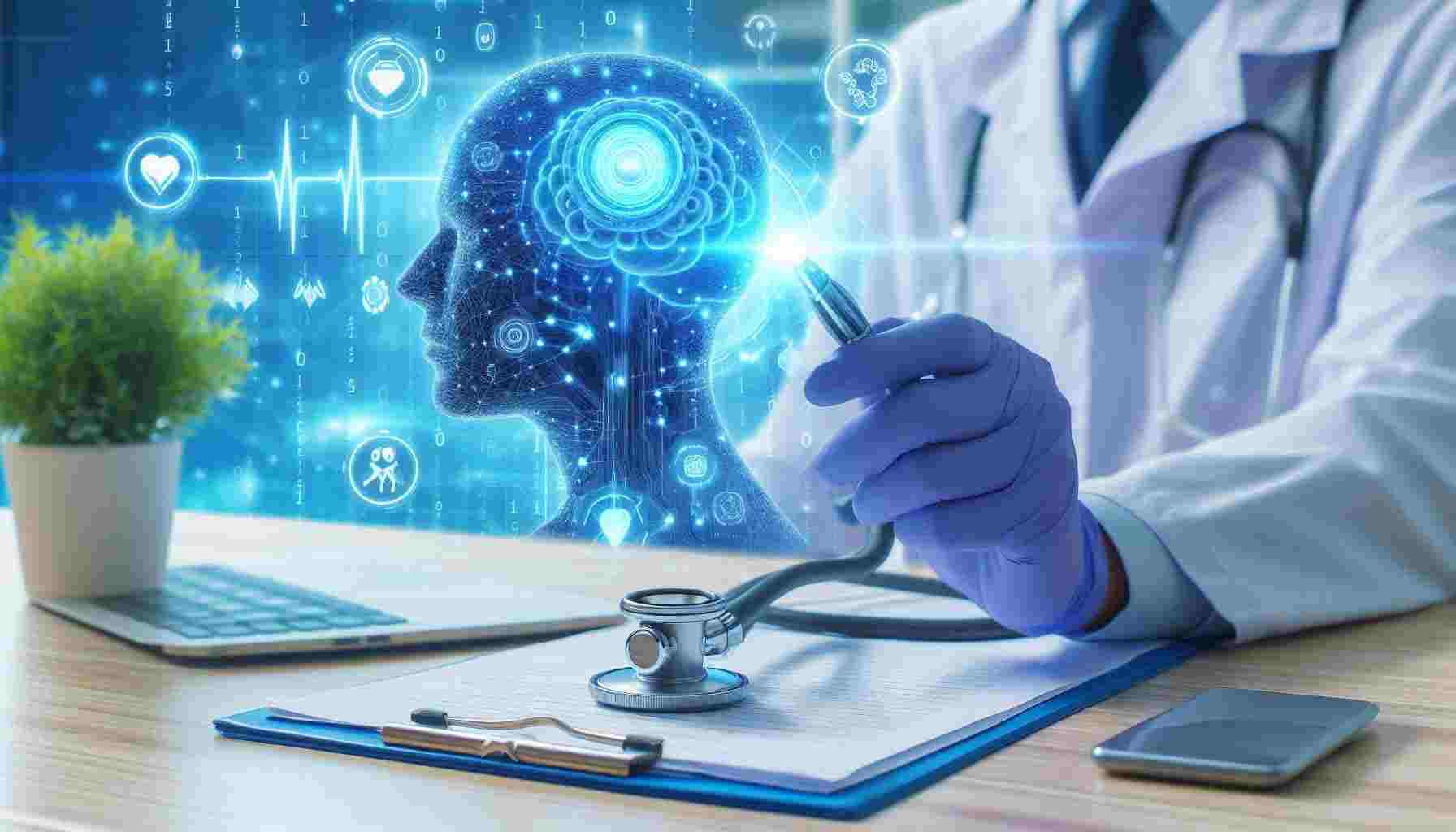
Artificial Intelligence in Healthcare: Revolutionizing Medical Diagnosis and Patient Care
The integration of artificial intelligence (AI) in healthcare is transforming the medical industry, revolutionizing how healthcare professionals diagnose diseases, treat patients, and enhance patient engagement. As AI technology in healthcare continues to evolve, understanding its impact and applications is essential for medical practitioners and patients alike.
Applications of AI in Healthcare: Improving Diagnostics and Personalized Medicine
Artificial intelligence is being widely applied across healthcare sectors, from medical imaging analysis and AI-powered diagnostics to personalized treatment plans and remote patient monitoring. Advanced machine learning algorithms analyze massive healthcare datasets, identify critical patterns, and deliver precise predictions, empowering doctors to make faster and more accurate decisions.
Benefits of AI in Healthcare: Enhanced Patient Care and Operational Efficiency
AI-driven tools like chatbots for patient support and virtual health assistants improve patient interaction, streamline administrative tasks, and provide 24/7 assistance. The rising adoption of AI in healthcare promises better patient outcomes, reduced healthcare costs, and increased operational efficiency across hospitals and clinics.
With continuous advancements, the future of artificial intelligence in healthcare holds enormous potential to redefine medical care, making it more accessible, precise, and personalized than ever before.
Artificial Intelligence in Healthcare: Transforming Medical Data Analysis and Patient Care
Artificial intelligence in healthcare leverages advanced machine learning algorithms and computer-based analytics to interpret complex medical data, delivering actionable insights that enhance clinical decision-making. AI technology is transforming key healthcare areas such as medical imaging analysis, AI-powered diagnostics, personalized treatment planning, and patient care management.
By utilizing big data in healthcare, AI systems can identify patterns, detect anomalies, and provide precise diagnoses. This enables healthcare professionals to develop customized treatment plans and improve patient outcomes while significantly reducing healthcare costs and boosting care quality.
Key Benefits of AI Adoption in Healthcare
The growing adoption of AI in healthcare is driven by the urgent need to enhance patient outcomes, optimize operational efficiency, and reduce expenses. AI-powered tools enable medical practitioners to analyze extensive healthcare datasets, identify high-risk patients, and implement targeted interventions to prevent complications.
AI-Powered Patient Support and Future Challenges
AI-powered chatbots and virtual health assistants are revolutionizing patient engagement by supporting health management, improving treatment adherence, and providing instant access to medical information. However, as AI continues to evolve within the healthcare sector, addressing ethical considerations in AI healthcare, regulatory compliance, and technical challenges remains crucial for sustainable implementation.
Embracing AI in healthcare paves the way for a future of smarter, faster, and more personalized medical care that benefits both patients and providers.
Top Benefits of AI in Healthcare: Improving Patient Outcomes and Reducing Costs
The benefits of artificial intelligence in healthcare are transforming the medical industry by enhancing patient outcomes, increasing operational efficiency, and significantly reducing healthcare costs. Advanced AI algorithms in healthcare empower medical professionals to analyze vast amounts of medical data, detect complex patterns, and deliver precise AI-powered medical diagnoses for better clinical decisions.
AI-powered chatbots and virtual health assistants boost patient engagement by providing timely support, personalized health advice, and improving the overall patient experience. As more healthcare providers adopt AI technology, the sector anticipates major advancements in patient care quality, cost reduction, and streamlined medical workflows.
How AI Reduces Medical Errors and Enhances Patient Safety
Implementing AI in healthcare helps reduce costly medical errors and enhances patient safety by proactively analyzing patient data to identify potential health risks. AI-driven tools alert clinicians to critical issues, enabling early intervention and preventive care.
Moreover, AI healthcare systems optimize clinical workflows by automating administrative tasks, reducing staff workload, and boosting healthcare professional productivity.
Addressing Ethical and Regulatory Challenges in AI Healthcare
While AI integration in healthcare promises exceptional benefits, it also raises important ethical, regulatory, and technical challenges. Ensuring compliance with healthcare regulations, protecting patient privacy, and maintaining transparency in AI decision-making are critical for successful AI adoption.
Closing the Gap: AI to Improve Healthcare Equity and Targeted Interventions
AI technologies are also pivotal in reducing healthcare disparities by identifying high-risk patient groups and enabling personalized, targeted interventions. By leveraging AI-powered virtual assistants, patients receive improved health management support, adherence to treatment plans, and easy access to medical information.
In summary, the rising adoption of AI in healthcare will continue to revolutionize the industry by enhancing patient outcomes, cutting costs, and optimizing healthcare delivery for a healthier future.
Top Applications of Artificial Intelligence (AI) in Healthcare: Transforming Medical Imaging, Diagnostics, and Patient Care
The applications of AI in healthcare are rapidly expanding, revolutionizing critical areas such as medical imaging, diagnostics, personalized medicine, and patient care. Cutting-edge machine learning algorithms analyze vast amounts of medical data to detect complex patterns and deliver precise predictions, empowering healthcare professionals to make informed clinical decisions.
One of the most promising uses of AI is in AI-powered medical imaging analysis. Advanced AI algorithms can accurately interpret medical images, identify abnormalities, and provide fast, reliable diagnoses. This accelerates the development of personalized treatment plans tailored to individual patient needs.
Enhancing Patient Engagement and Clinical Efficiency with AI
AI-powered chatbots and virtual health assistants are transforming patient engagement by offering 24/7 support, personalized health guidance, and seamless communication. These technologies enhance the overall patient experience and promote better health management.
Furthermore, AI solutions optimize clinical workflows by automating administrative tasks, reducing healthcare providers’ workloads, and boosting productivity. This leads to improved healthcare delivery, faster diagnosis, and cost savings across medical institutions.
Improving Healthcare Outcomes and Reducing Disparities through AI
The integration of AI in healthcare is instrumental in improving patient outcomes and reducing healthcare disparities. AI systems analyze large-scale medical datasets to identify high-risk patients and enable targeted interventions that enhance care quality.
AI virtual assistants assist patients in managing chronic conditions, adhering to treatment plans, and accessing vital medical information anytime, anywhere. With growing AI adoption, the healthcare industry anticipates significant advancements in efficiency, cost-effectiveness, and patient satisfaction.
Challenges and Limitations of AI Adoption in Healthcare: Ensuring Safe and Ethical Integration
The widespread adoption of artificial intelligence (AI) in healthcare presents transformative benefits but also comes with significant challenges and limitations. One of the primary obstacles is the need for high-quality medical data, which is crucial for training accurate and reliable AI algorithms. Moreover, the lack of standardized data formats, consistent protocols, and clear guidelines for developing and deploying AI-powered healthcare systems slows down effective implementation.
Addressing Ethical, Regulatory, and Technical Challenges in AI Healthcare
Integrating AI into healthcare raises important ethical concerns, including the potential for algorithmic bias and issues with accuracy and reliability that directly impact patient safety and care quality. To navigate these challenges, there is a pressing need for transparent AI models, robust accountability frameworks, and clear regulatory standards that ensure the ethical use of AI technologies in medicine.
Healthcare stakeholders must focus on explainability of AI algorithms to build trust and provide clinicians with clear insights into AI-driven recommendations, helping them make informed decisions while maintaining patient safety.
AI’s Impact on Healthcare Jobs: Augmentation Over Replacement
Concerns about job displacement due to AI in healthcare are common, but AI is primarily designed to augment healthcare professionals rather than replace them. By automating routine data analysis and pattern recognition, AI empowers clinicians to focus on complex patient care and decision-making.
With AI assisting healthcare providers in managing vast amounts of medical data, improving diagnostic accuracy, and optimizing treatment plans, the future of healthcare promises improved patient outcomes, reduced operational costs, and greater clinical efficiency.
Addressing these AI challenges in healthcare proactively will ensure the safe, ethical, and effective integration of AI technologies, ultimately transforming patient care and healthcare delivery worldwide.
Future Prospects of AI in Healthcare: Transforming Patient Care and Medical Innovation
The future of artificial intelligence (AI) in healthcare is exceptionally promising, with rapid advancements and widespread adoption expected in the coming years. As AI technology evolves, the integration of AI-powered systems, including chatbots and virtual assistants, will become increasingly prevalent, revolutionizing the way healthcare professionals analyze medical data and make critical clinical decisions.
Advancements in AI-Driven Medical Data Analysis and Predictive Healthcare
One of the key future trends in AI healthcare is the development of advanced systems capable of processing and analyzing large volumes of medical data. These AI algorithms can identify complex patterns and deliver accurate predictions that enable healthcare providers to diagnose conditions earlier, personalize treatment plans, and improve overall patient outcomes. The adoption of AI tools will help identify high-risk patients and implement targeted interventions to reduce healthcare disparities and optimize care delivery.
AI-Powered Patient Engagement and Healthcare Efficiency
AI-powered chatbots and virtual health assistants will play a crucial role in improving patient engagement by helping patients manage chronic diseases, adhere to treatment protocols, and easily access reliable medical information. These technologies will enhance the quality of care while reducing operational costs and administrative burdens within healthcare organizations.
Driving Innovation: Emerging AI Technologies in Healthcare
The healthcare industry will continue to witness significant innovation driven by AI, including the creation of new AI tools and technologies that streamline workflows and enhance clinical productivity. From predictive analytics and automated diagnostics to personalized medicine and remote patient monitoring, AI will empower healthcare professionals to deliver more precise, efficient, and cost-effective care.
As AI adoption accelerates, healthcare providers can expect sustained improvements in patient outcomes, cost reduction, and enhanced operational efficiency, making AI a pivotal force in the future of medicine.
Conclusion: The Transformative Impact and Future of AI in Healthcare
The integration of artificial intelligence (AI) in healthcare is revolutionizing the medical industry by driving significant improvements in patient outcomes, reducing operational costs, and boosting healthcare efficiency. AI technologies play a critical role in minimizing healthcare disparities and enhancing the overall quality of patient care.
As AI adoption in healthcare continues to accelerate, it is crucial to address key ethical, regulatory, and technical challenges to ensure safe, reliable, and effective implementation. Overcoming these obstacles will unlock the full potential of AI-powered solutions and foster trust among healthcare providers and patients alike.
Promising Future Advancements in AI Healthcare Technologies
The future of AI in healthcare looks bright, with ongoing advancements in AI-powered systems, chatbots, and virtual health assistants expected to further transform clinical workflows and patient engagement. There is an increasing demand for AI tools capable of analyzing vast amounts of medical data to identify critical patterns and deliver accurate predictive analytics, empowering healthcare professionals to make well-informed decisions.
Driving Innovation and Efficiency with AI in Healthcare
AI-driven innovation will continue to introduce new healthcare technologies, tools, and platforms designed to optimize clinical productivity and enhance personalized care. With widespread adoption, AI is poised to deliver lasting improvements in patient outcomes, cost reduction, and operational efficiency, marking a new era in healthcare delivery.
In summary, addressing the evolving challenges and responsibly implementing AI in healthcare are essential to maximize benefits and create a safer, smarter, and more equitable healthcare system for the future.

tyw80z